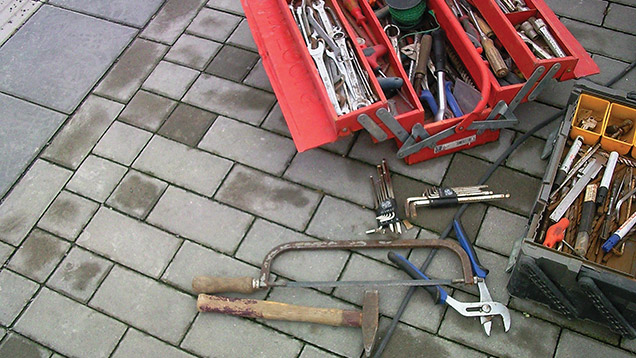Rumours of Grace: Magic: Out of a plumber's tool box
 CREDIT: "(NOT MY) TOOLBOX" BY ERICH FERDINAND ON FLICKR (CC BY 2.0)
CREDIT: "(NOT MY) TOOLBOX" BY ERICH FERDINAND ON FLICKR (CC BY 2.0)Solving problems and generating wonderful things, that is the glory of God revealed in a tool box.
One of the discoveries I made this summer is available on Netflix. It is a show called How We Got to Now hosted by Steven Johnson. In it he explores technological innovations that led to some of the cool things about our world.
For example, large cities used to be filthy and the water would make you sick. Now, when you go to downtown London on a rainy afternoon, chances are you are not walking ankle deep in filth. It is also unlikely that anyone will catch a disease from any of the water coming out of our taps. Cities were not born this way, so how did this happen?
For one thing there was the jackscrew, which was in use in the railway industry in the 1800’s. The jackscrew also helped the city of Chicago deal with its drainage problem.
The city was too flat for fouled wastewater to run naturally down into Lake Michigan. To fix this problem, an engineer named Ellis Chesbroug in the 1840s decided that the solution to the problem of how to get water to drain out of Chicago would be to raise city buildings ten feet on thousands of jackscrews.
People would come from all over the planet to see huge buildings being lifted, sometimes with inhabitants and workers still in them. The spaces around the buildings were backfilled and installed into the fill were sewers to drain waste and rain water into the lake.
Though this solution created another problem because Chicago drew its drinking water from the same lake. People at that time did not realize that the reason they were getting sick was because the same water they were draining out of the city was also their drinking water.
This issue was resolved when another pioneer experimented with the drinking water of New Jersey. He took a big gamble by poisoning the public water supply with chlorine. Suddenly, the incidence of diseases like typhoid and cholera fell dramatically.
Today, vast underground sewage systems are part of every North American and European city. Though, we take for granted that the water coming out of our taps is safe.
One of the things about Johnson is that he narrates his documentaries with a sense of wonder. For him, the connections that make amazing changes a reality are a source of delight. We see him in underground sewers and in high tech labs grinning as if he has just made an amazing discovery.
The world, as is said in the Christian Bible, is full of the glory of the Lord. Our ability to solve complicated problems, to collaboratively generate huge and wonderful changes is a reflection of this glory and Johnson helps to expose it.
Some time ago I was a sheet metal apprentice. It did not work out because a lot of sheet metal work involves installing ducts in high ceilings and also because I discovered that I did not like heights.
The journeyman whom I worked with was a wonder; he would come into a commercial construction site and quickly map out what needed to be done and when they needed to be done.
He had an instinct for being at the right place at the right time. He understood how to manage cranes as they lowered large heating and cooling units into rooftop positions. He showed me without saying anything or thinking about it that the development and implementing of day-to-day technologies is a reflection of the glory of God.
Enjoy your education in the trades if that is what you are here for. When you use your toolbox well, it is like magic. It becomes an instrument of the glory of God.
Editorial opinions or comments expressed in this online edition of Interrobang newspaper reflect the views of the writer and are not those of the Interrobang or the Fanshawe Student Union. The Interrobang is published weekly by the Fanshawe Student Union at 1001 Fanshawe College Blvd., P.O. Box 7005, London, Ontario, N5Y 5R6 and distributed through the Fanshawe College community. Letters to the editor are welcome. All letters are subject to editing and should be emailed. All letters must be accompanied by contact information. Letters can also be submitted online by clicking here.














